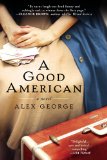Summary | Excerpt | Reading Guide | Reviews | Beyond the Book | Readalikes | Genres & Themes | Author Bio

A Novel
by Alex GeorgeExcerpt
The Good American
[The book's narrator, James Meisenheimer, discovers the delights of English humor.]
Rosa told me lots of good jokes. Even better, she taught me how to tell them. Boys tend to race through jokes, desperate to get to the punch line. My aunt taught me to slow down. She showed me how each joke was put together - where to pause, what to emphasize, how to deliver the pay-off. She made me practice the same routine over and over again, and then sent me home to perform it for my brothers.
Encouraged, I began to study the professionals. Jette had a radio in her living room, and we would listen to the first superstars of comedy while we leaned over the chessboard: Abbott and Costello, Amos n' Andy, George Burns and Gracie Allen, Edgar Bergen. Rosa liked Jack Benny best, but Eddie Cantor was my favorite. Sunday nights belonged him. I adored his fast-talking, wise-cracking delivery, but what I liked most of all was that he was a monologue merchant. The other comedians worked in teams and played off each other, but Cantor's comic momentum was sustained by nothing more than the sheer, unrelenting force of his wit.
The next stage of my education in comedy began in the summer of 1950, on my thirteenth birthday. Rosa appeared at our house while we were still eating breakfast. "Here," she said, thrusting a small package into my hand. "It's time to introduce you to the master." I eagerly tore off the wrapping paper and then had to try and hide my disappointment as I held up the gift for general inspection.
My aunt had given me a book.
I was at an age when covers were the only thing I ever thought of judging a book by, and this one did not look promising. There was a picture of a young man dressed in a tuxedo, leaning back against a table with an anxious look on his face. He had raised one elegantly-clad leg, at the end of which dangled a small dog, hanging on to the man's trousers with its teeth. In the background was a woman in a red dress, her hand raised to her face in consternation. I took all this in, dubious. At the time my tastes in fiction were limited to cowboys, aliens, and wartime derring-do. I gazed at the man in the tuxedo suspiciously, but it was the presence of the woman that really set the alarm bells ringing. I could not imagine why I would ever want to read a book with female characters in it. At that point in my life, my knowledge of women was derived exclusively from the lyrics of barbershop songs, and as a consequence I regarded all females with deep suspicion. They were to blame for all the mushy drivel that we had to sing week in and week out. Girls were to be serenaded, put up on a pedestal, and worshipped. Much of our repertoire was really no more than elaborate begging: Won't you please be mine? Dream a little dream of me! Let me call you sweetheart! Women made men act like idiots, I knew that much. And I was pretty sure they wouldn't be much use in a shoot-out, of either the intergalactic or terrestrial variety.
"Thank you," I said politely.
"Funniest thing I've ever read," Rosa told me.
The book was called The Code of the Woosters, by P. G. Wodehouse. Again, this was far from promising. I did not know if this P. G. Wodehouse was male or female. I turned the book over, looking for clues. "P. G. Wodehouse," I mused. I pronounced it Woad-house.
"Wood-house," corrected my aunt.
"That's not how it's spelled," I objected.
"Yes, well, he's English, you see," said Rosa, as if that explained everything.
I greeted this news with mixed feelings. Everything I knew about the English I had learned from cheap dime-store paperbacks whose stories were set in wartime Europe. It was not uncommon for a brave but stupid English pilot who had been shot down over France to stumble in half way through the narrative and complicate matters for the gutsy American hero who was single-handedly trying to save the Allied war effort from defeat by delivering secret battle plans, intercepting secret battle plans, or possibly destroying secret battle plans. The Englishman's principal dramatic purpose was to introduce an element of levity. His attempts to help the gutsy American hero would be benign but hapless, and invariably ended up making things worse. Still, at least the English always acted honorably - which was more than could be said for the French.
Excerpted from A Good American by Rose George. Copyright © 2012 by Rose George. Excerpted by permission of Amy Einhorn Books. All rights reserved. No part of this excerpt may be reproduced or reprinted without permission in writing from the publisher.
Your guide toexceptional books
BookBrowse seeks out and recommends the best in contemporary fiction and nonfiction—books that not only engage and entertain but also deepen our understanding of ourselves and the world around us.